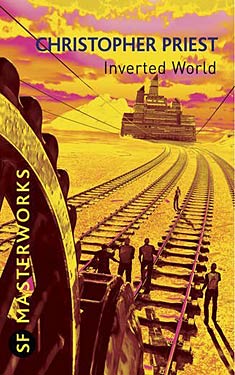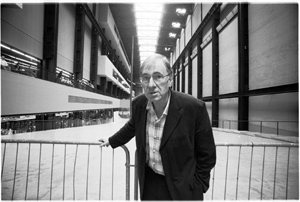When Helward Mann leaves town he has no reason to think that the world beyond is not altoghether alien. But in fact, despite all he has always been told, there is evidence that slowly contradict all his convictions. As he grows his work experience outside the city, he is forcedin his struggle for survival
to accept the rationale.
As a member of one of the guilds that manages to move the city on rails, plowing a wasteland full of hostile tribes he lays the rails in front of the city and carefully removes them in its wake. The rivers and mountains are a virtually insurmountable obstacle to the technical ingenuity of the guilds but if it stops moving, the city will fall in the gravitational field that has become destructive of all life on Earth. So, the only alternative to death is progress.
This is a classic science fiction book, one in which the laws of physics may seem a little strained but are explained at the end. Mysteries unraveled keep the reader interested throughout the book. Everything is centered at first in the moving city: how, why, when, and the Guild society within. Weird and exciting in the middle, it ends with a more realistic note. This is a cold book, relationships and characters are even chilly but in spite of this, that makes a bit difficult to become involved with the characters and their lives, its utterly fascinating and keeps you guessing about the nature of reality until the end.
awards: BSFA winner, 1974, Hugo Award nominee, 1975
Christopher Priest was born in Cheshire, England. He began writing soon after leaving school and has been a full-time freelance writer since 1968. He has published eleven novels, four short story collections and a number of other books, including critical works, biographies, novelizations and children’s non-fiction.
His most recently published novel The Separation won both the Arthur C. Clarke Award and the BSFA Award. In 1996 Priest won the James Tait Black Memorial Prize for his novel The Prestige. He has been nominated four times for the Hugo award. He has won several awards abroad, including the Kurd Lasswitz Award (Germany), the Eurocon Award (Yugoslavia), the Ditmar Award (Australia), and Le Grand Prix de L’Imaginaire (France). In 2001 he was awarded the Prix Utopia (France) for lifetime achievement.
He is Vice-President of the H. G. Wells Society.
He is married to the writer Leigh Kennedy. They live in Hastings, England, with their twin adult children, Elizabeth and Simon.
Science-Fiction and Fantasy books. What we read and why we love the genre.
Mar 1, 2011
Christopher Priest - The Inverted World
Etiquetas:
Author - Chistropher Priest,
Sci-Fi - Classic
Lois Lowry - Giver
With a reputation for being "one of the most banned books in American schools", the Giver is a powerful novel that keeps you reading and thinking about.
The Giver is a futuristic vision of a seemingly perfect society in which everyone wears a life nicely ordered and directed. Life goes quietly into a community where all are equal, there is no hatred or fear, but no feelings nor any memory of the past.
Jonah lives in a household in the community and faces the Ceremony of Twelve in which he will be given the mission to be carried the rest of his life.
But Jonah is special, and he's afforded the most honorable and respected professions within the Community: he will be the new host of memories. Above this, lie the burden of remembering all those feelings, experiences and pains that have no place within the Community. The old receiver becomes the giver that turns on Jonah all stored memories of past world and from that moment Jonah will never be the same ...
Some facts: titles:
The Giver
Number the Stars
Gathering Blue
Messenger
Gossamer
The Silent Boy
Looking Back
A Summer to Die
The Gooney Bird Series
The Anastasia Series
The Sam Series
Lowry won the Edwards Award in 2007
The Giver is a futuristic vision of a seemingly perfect society in which everyone wears a life nicely ordered and directed. Life goes quietly into a community where all are equal, there is no hatred or fear, but no feelings nor any memory of the past.
Jonah lives in a household in the community and faces the Ceremony of Twelve in which he will be given the mission to be carried the rest of his life.
But Jonah is special, and he's afforded the most honorable and respected professions within the Community: he will be the new host of memories. Above this, lie the burden of remembering all those feelings, experiences and pains that have no place within the Community. The old receiver becomes the giver that turns on Jonah all stored memories of past world and from that moment Jonah will never be the same ...
Some facts: titles:
The Giver
Number the Stars
Gathering Blue
Messenger
Gossamer
The Silent Boy
Looking Back
A Summer to Die
The Gooney Bird Series
The Anastasia Series
The Sam Series
Lowry won the Edwards Award in 2007
Etiquetas:
Author - Lois Lowry,
Sci-Fi - Social
Charles L. Harness - The Paradox Men (or Flight into Yesterday)
Alar the thief, the man without memory, is confronted with Haze-Gaunt, chancellor of Imperial America. This one likes petting his tarsier, that stares from his shoulder with a terrified expression. We are in the XXII century. Society is quite advanced as far as technology and space travel are concerned, but it has reinstated slavery and the sword fights are common.
The hero, Alar, can not remember who he was or what happened before leaving his destroyed spaceship, five years earlier. Apparently, the ship, faster than light, had come full circle to the world, traveling into the past, to reach the Earth five years before its release. The tarsier, now Haze-Gaunt's pet, also comes from that spacecraft. Alar has strange powers, like a human being highly 'evolved', while the tarsier is possibly a human being who has evolved. Who's Alar? And besides, who is the tarsier? As the novel moves toward its denouement, the launch of the spacecraft, these questions are of increasing importance and the fate of humanity depends on the answers.
Short book, great ideas, although its prose doesn't specially stand out, Harness used quite playfully Einstein's physics and and the cyclical theory of history Arnold Toynbee in this particular parable of human transcendence.
Charles L. Harness was born in Texas in 1915. He has degrees in chemistry and law, and worked as a patent lawyer in Connecticut and Washington D.C. for more than thirty-five years. He was first published in 1947—and he is still producing exciting and refreshing science fiction tales.
During this impressive time span, he produced eleven novels and more than thirty shorter works (often in the form of novellas and novelettes). His stories are characterized by Byzantine plots and myriad baroque ideas, through which serious social themes are woven. He writes about love and transcendence, humanity and hope.
The hero, Alar, can not remember who he was or what happened before leaving his destroyed spaceship, five years earlier. Apparently, the ship, faster than light, had come full circle to the world, traveling into the past, to reach the Earth five years before its release. The tarsier, now Haze-Gaunt's pet, also comes from that spacecraft. Alar has strange powers, like a human being highly 'evolved', while the tarsier is possibly a human being who has evolved. Who's Alar? And besides, who is the tarsier? As the novel moves toward its denouement, the launch of the spacecraft, these questions are of increasing importance and the fate of humanity depends on the answers.
Short book, great ideas, although its prose doesn't specially stand out, Harness used quite playfully Einstein's physics and and the cyclical theory of history Arnold Toynbee in this particular parable of human transcendence.
Charles L. Harness was born in Texas in 1915. He has degrees in chemistry and law, and worked as a patent lawyer in Connecticut and Washington D.C. for more than thirty-five years. He was first published in 1947—and he is still producing exciting and refreshing science fiction tales.
During this impressive time span, he produced eleven novels and more than thirty shorter works (often in the form of novellas and novelettes). His stories are characterized by Byzantine plots and myriad baroque ideas, through which serious social themes are woven. He writes about love and transcendence, humanity and hope.
Etiquetas:
Author - Charles L. Harnes,
Sci-Fi - Classic
Subscribe to:
Posts (Atom)





